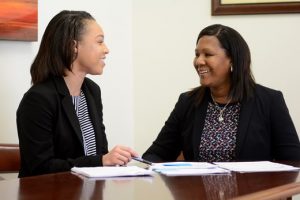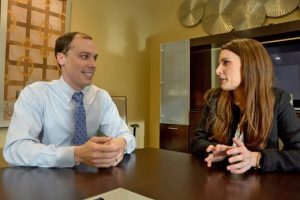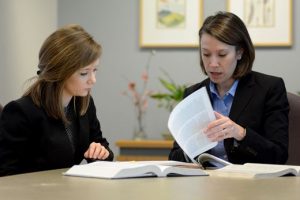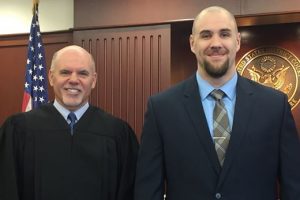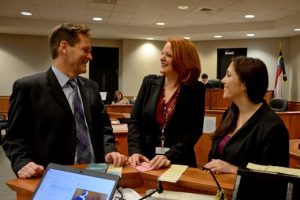Residency Testimonials
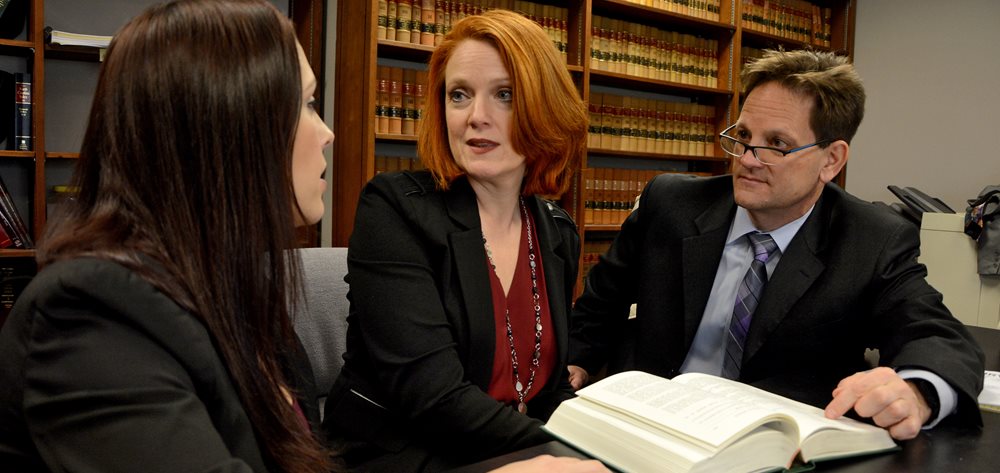
Learning by doing in full-time legal residencies
“Transformational” for “turning theory into practice” is just one way students have described their assignments and responsibilities in their Residency-in-Practice.
Even more important for these students? Bearing witness to how the law can change lives and shape society.
In a mandatory curriculum unique to American legal education, second-year Elon Law students work around the nation each year to learn how law is practiced and applied in the courts, private firms, government agencies, nonprofits, corporations and other law offices.
Students have worked for federal and state judges. Law firms large and small. Prosecutors and public defenders. The U.S. Committee for Refugees and Immigrants. Legal Aid of North Carolina. The Transformative Justice Coalition. The Southern Environmental Law Center. And many more.
In coordination with an Elon Law faculty member who helped them identify individual learning outcomes, students spent 10 weeks in residency with attorneys and judges who helped them better understand the professionalism and knowledge required for professional success. Interests in specific areas of law drive the placement process, enabling students to develop specialized knowledge and skills, while building credentials and networks that support their career goals.
Read what some Elon Law students had to say about their residencies-in-practice and how those experiences prepared them for the start of their legal careers.
Alishia Tidwell
Residency: Charlotte-Mecklenburg Board of Education
Charlotte, North Carolina
“My supervisor, Ms. Mayes, is very professional and skilled in what she does so I learned a lot about what is good practice and how to conduct myself as a good lawyer. She has taught me the importance of attention to detail, being prepared, knowing your case, and even some organization tips. Without my residency, I would not understand the practicality of the information that I was learning. I have had civil procedure, employment, and constitutional law issues come up. I was able to put the information that I learned from class into practice and turn it into a skill rather than just knowledge.”
Helen Tsiolkas
Residency: The Carroll Companies
Greensboro, North Carolina
“Working in an in-house setting has given me the opportunity to see how different departments within in a large company collaborate toward a common goal. All of my previous work experience had been in a traditional law firm environment, focusing on one client and their needs. I now work for a company, as opposed to an individual client, but have had the chance to be exposed to countless areas of law for any given project. I don’t have the luxury of working on one assignment at a time, so I’ve learned how to more effectively manage multiple time-sensitive projects and prioritize them accordingly.”
Rebecca Anderson
Residency: Southern Environmental Law Center
Chapel Hill, North Carolina
“This experience has reinforced my commitment to the field of environmental law, particularly in North Carolina, because I have been exposed to the importance of imposing a heightened standard upon those officials tasked with creating and implementing our environmental laws to ensure the protection of sensitive individuals and communities impacted by these laws. I have learned how to interview client members … and while interview skills are important in any practice area, it is particularly important in environmental law. I don’t think that a typical classroom setting would have prepared me for an interview as well as conducting one on my own for an actual case.”
Jeremy Boissy
Residency: Chambers of Chief U.S. District Judge Glenn T. Suddaby
Syracuse, New York
“My residency has allowed me to turn theory into application. Instead of just reading about judicial decision-making and procedural history, I get to participate in it. I have the opportunity to observe and analyze the real-life impacts these decisions have on individuals and families. Not only am I better equipped to critically analyze issues and arguments, the residency has also allowed me to better analyze my own strengths and weaknesses and am better equipped to leverage those strengths as I prepare for class and the bar.”
Melissa Sumner
Residency: Guilford County Public Defender’s Office
Greensboro, North Carolina
“I have been struck several times by the human aspect of practicing law. Your clients are usually facing decisions that will affect them for the rest of their lives, and they need guidance. It is extremely personal, as you are sharing in the excruciating details of his or her life story. I have felt privileged to be there, and there have been lessons I could never have learned in class. And my approach to classes now has a different perspective. I am no longer studying to outperform the person sitting next to me. I am studying to prepare myself for a career out in the world.”

Hunter Cornelius L'20 reflects on his Residency-in-Practice with the Hon. Albert Diaz
Working full-time with a judge on the U.S. Court of Appeals for the Fourth Circuit provided Elon Law student Hunter Cornelius L'20 an opportunity to hone legal writing skills developed in the Legal Method & Communication Program.

Kaila D. Baccas L'20 on the many benefits of her Elon Law Residency-in-Practice work at Toshiba
Completing legal assignments for the in-house counsel of Toshiba Global Commerce Solutions in Raleigh, North Carolina, offered Kaila D. Baccas L'20 an opportunity to explore several practice areas through Elon Law's Residency-in-Practice Program. Baccas is pursuing her MBA through Elon Law's dual-degree program with the Martha & Spencer Love School of Business. Her residency complemented her current interests in corporate law.

Brooke LaMachio L'20 reflects on her Residency-in-Practice experiences at The Carroll Companies
For Brooke LaMachio L'20, working full time for one of the largest private real estate developers in the Southeast as part of her Elon Law studies not only confirmed her interest in corporate law - it helped The Carroll Companies grow the economy and communities of a nation she loves.

Evan Tarver L'20 details his Residency-in-Practice with the Small Business & Entrepreneurship Clinic
Articles of incorporation. Intellectual property. COVID-19 resources for businesses. Evan Tarver L'20 completed his Elon Law Residency-in-Practice and subsequent summer work with the law school's Small Business & Entrepreneurship Clinic, an experience that complemented his professional ambitions of working in public interest law.

Kjirsten Durand-Johnson L'20 on the value for future students of a Residency-in-Practice at Syngenta
Kjirsten Durand-Johnson L'20 completed her Elon Law Residency-in-Practice for Syngenta, an international biotechnology and agricultural corporation with offices in Greensboro, North Carolina. As a student enrolled in Elon Law's JD/Master of Environmental Law and Policy dual-degree program, Durand-Johnson discovered opportunities to learn about the intersection of environmental law and agribusiness as she worked full-time with Syngenta attorneys representing a variety of practice areas.
About Elon Law
Twice recognized by preLaw Magazine for its innovative approach to legal education, Elon Law is the preeminent school for engaged and experiential learning in law. Its 2.5-year curriculum emphasizes learning by doing and positions students to excel in the rapidly evolving legal profession with better preparation, stronger professional partnerships, and exceptional value unlike any other American law school.
Highlights of Elon Law’s program:
- The first and only law school to ensure that all students benefit from full-time, course-connected residencies in the practice of law
- Experiential learning integrated throughout the curriculum, with students earning more required academic credits through experiential coursework than any other law school
- An introductory course for all students to develop skills essential for success in law school and the legal profession, including legal analysis, writing and professionalism
- A seven-trimester schedule in which students complete their studies in December, allowing them to take the February bar exam and begin law practice in the spring, six months before peers at other schools
- A tuition 20 percent lower than the private law school average and guaranteed not to increase, plus substantial scholarship and fellowship opportunities
